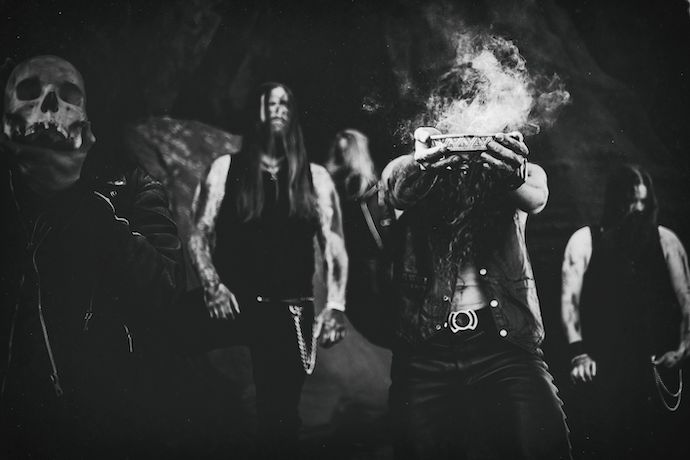
photo by Void Revelations
(Our Norway-based interviewer Karina Noctum brings us this discussion with Joshua Hróðgeir Rood, vocalist of the extreme metal band Nexion, whose debut album Seven Oracles was released by Avantgarde Music in June of this year.)
Nexion hail from Iceland, a country which has been in the metal spotlight for a while now. Earlier this year they released their first album which is recommended for people who appreciate a mix of Black and Death Metal with an eerie feeling to it.
I got to interview Joshua Hróðgeir Rood, the vocalist, who moved to Norway recently from Iceland. I found out more about their latest album Seven Oracles, including the lyrical themes and vocal approach, and of course thoughts about Black Metal and Norway.
Where and when did the band start?
We started, I think it was 2016, in Reykjavík. A friend of mine told me that Jóhannes and Óskar were forming what would probably be a pretty serious band, and that they wanted a vocalist who was different from the others. I met them at a practice space called Hellirinn in Reykjavík and they showed me what they could do and I showed them what I could do. It sorta went from there.
What were you aiming at in the very beginning?
Our initial aim was to get a full lineup and work through enough songs to find out what sort of chemistry we had. We actually wrote 6 songs which were never recorded before we ever wrote the 4 songs which are on our EP [2017’s Nexion]. We never recorded them because those were our initial growing pains… experimentations to see what sort of chemistry we had as a band, and what sort of sound and direction we would go in. We also went through a couple members in that period. So initially our goal was to discover ourselves.
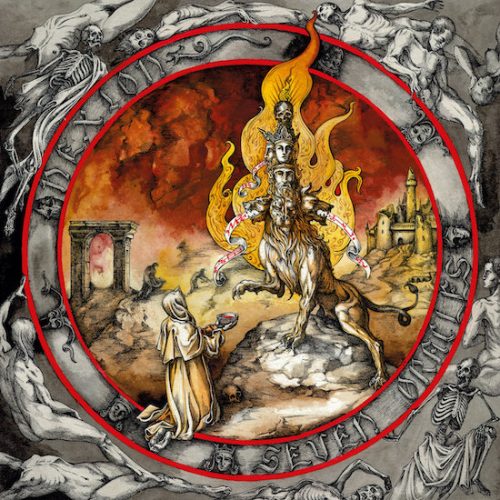
How long did it take for you to complete the latest album?
A little over a year. The first song we wrote which is on Seven Oracles was “Sanctum Amentiae”. “Utterances of Broken Throats” was written shortly after. But then we needed to prepare for a few metal festivals, Midgardsblot, Eistnaflug, and set writing aside. When the festival season cleared up we spent about a year writing, preparing to record, and finally going into the studio. Then it was almost another full year before the album would be released, because we were figuring out which label we felt most comfortable with, and then the printing and release campaign schedule.
How does the process of composing work for you?
That really depends. We might go several months without anything happening, and then suddenly a collective surge of creativity happens. Half a song might shape itself in a single evening and then nothing happens to it for months before suddenly the rest of it emerges. And in that time we might have set it aside and written one or two other full songs. We don’t force our songs, and if they don’t have the essence that we want then we don’t push it. But our members get together and attempt to create or build on what we are creating several times a week.
Who was the producer?
Stephen Lockhart at Studio Emissary.
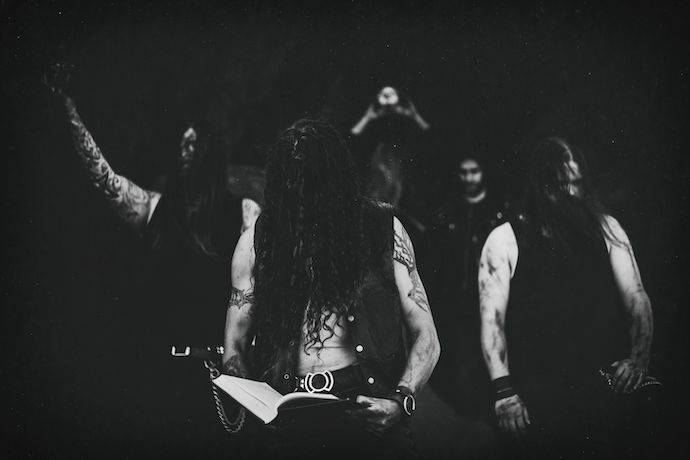
photo by Void Revelations
Do you prepare a lot before going to the studio a few times and get everything done? Or do you use the studio as much as possible until you are satisfied with the result?
It’s a little bit of both. Nobody wants to waste their own time and money, or the studio’s time, so we do a lot of preparing and ironing out everything before we go into the studio so that we have a very clear vision of what we are doing. But we also refuse to “settle”. Nexion doesn’t believe in a “good enough”. That’s why we don’t have a shitty quality “demo” release. The first thing we let anyone hear of us was our EP.
If our name is on something, we are completely satisfied that it represents what it was meant to represent. We stay in the studio until every song says and feels what it is meant to say and feel. That includes imperfections as well as spontaneous changes or additions or removals. In a way we are giving life. You have an idea of what you want, but you need to let it shape itself. In the end, the songs are the masters of themselves, and we are only their servants. Tending to them until they are fully realized.
How did corona affect your release and touring plans, if any?
It completely fucked us. We were supposed to premiere the album at the Ascension black metal festival in Iceland in May, and we were supposed to follow it up with another big festival which I cannot name because we are now yet to be confirmed for their rescheduled date next summer. We would have toured this winter, and we anticipated that the festivals we had booked this summer would have lead to further tours next summer. As it is, we are uncertain when we will get to play again. It was our debut album, and it was released during the middle of an epidemic that gutted our chances to promote it. We aren´t really sure what the future holds now.
How has the sound of the band evolved comparing the latest effort with other recordings?
We only have one other release, our self-titled EP. I cannot say how our sound has evolved as I think I’m too close to the music. I prefer to leave that to the reviewers. I can say that we have at least attempted to expand our sound a bit from the EP. One thing I do notice is that some of the elements on the EP are less congruent than others. For example, some parts are quite death metal. On Seven Oracles we have managed to create a sound that is more unifying and less segmented. But I think this is normal. Whenever a new band forms, it brings in the elements of 5 different members, and those different elements slowly melt together to create something more cohesive. That takes time.
What are the lyrics all about?
Life, the Universe, and Everything. If Lovecraft, Crowley, and the pessimist philosophers of the past 200 years spent their lives studying ancient gods and devils, and formed a doomsday cult as a reaction to the dystopian shithole this species is collapsing itself into….that might look something like our lyrics. We don’t put restraints on what our lyrics are about. I suppose it is how we talk about subjects and our perspective that matters.
How did you prepare to write the lyrics? What are these based on?
The lyrics aren’t specifically based on anything, but they are derived from too many sources to list. It’s like asking an author or poet or prophet what their books, poems or texts are based on. Everything that came before. Nexion is, I suppose, a mythological manifestation of existential nihilism, of pessimism towards the human condition. Its imagery and visions are derived from texts, philosophies, dead and living spiritualities, and woven into something new. I know that’s vague but I hope the lyrics and imagery maintain a life of their own.
How I prepare is another story. It’s actually a weird process. I already have the concepts of full albums mapped out. The challenge is translating these into actual lyrics befitting each individual song. And that depends on the mood of the song and its own rhythmic and melodic structure. I come up with the vocal patterns before I ever fill in any of the actual words, and I do that over a course of trial and error and experimentation in rehearsal. It’s kind of funny because we have played numerous shows where I didn’t have lyrics. I had the vocal patterns mapped, but no words. So I was screaming nonsense. Filling in the lyrics takes a long time for me. It’s actually a bit excruciating.
What kind of nonsense were you screaming about? Did you come up with stuff as you performed? It sounds like the vocals were more like another instrument…
Vocals are another instrument! They are the one instrument that bridges the inhuman instruments and beats with the organic human body. I am an instrument, and I become the music when I perform it. I see myself as simply a way of channelling the spirit of the song, and trying to put words to what it is saying. When I am composing lyrics, in the early stages the song has a conceptual idea. Images and moods play through me when I submerse myself into the music. The early vocal outbursts are purely feeling or instinct. Sometimes words shape themselves, but it’s never planned beforehand. They just might reflect what I see or feel. Every time I go over the song, I have a better vision of what the song is meant to say. And that’s when I sit down and begin stringing words together.
So my process is a little bit of both. It’s a constant dialogue between the music shaping my ideas, and my ideas becoming words. I am the tongue of Nexion. I say what the music tells me to say. But I am also a part of the force that gives life to that music.
What distinguishes Nexion from other bands coming from Iceland?
Well there are so many bands in Iceland and everyone has their own distinguishing marks. But the fact that I am not Icelandic, and I have a different sounding voice than others in this small scene might be one thing. We have members from both the black metal scene and the death metal scene, and you can hear that on our EP. At the end of the day, it’s our music. Words can’t adequately describe the differences between bands. But our music certainly is its own thing.
Can you describe what your vocal approach is?
I have always been fascinated with the different ways that humans can make sounds and I think that the human voice can create and capture mood just as well or better than any instrument. Since I was a kid I would try to learn how to make the sounds that I heard various metal vocalists use, as well as the vocal techniques I heard in different cultures’ folk music. Once I started taking the idea of being a vocalist seriously, I started pushing myself to learn, and master every technique that I could. Even if I never plan on using a particular vocal technique, I learn it, and over time, it becomes just one more technique that I have.
But vocal techniques are just that. Techniques. Methods that allow the vocalist to better express the particular feeling, atmosphere or energy they are aiming for. Like the color palette that a painter uses. At the end of the day, I want to really conjure and physically embody the emotion, the mood, and the message of what Nexion, or any other project I am involved in is trying to express. I take that very seriousy. If I cannot feel the music, I cannot or will not be able to put vocals to it.
Which bands have influenced your voice?
Countless bands. I can’t begin to list them. Even vocalists I hate have influenced me in that I made a point of recognising what it is I hate about their vocals, and avoiding doing that myself.
What do you think about Icelandic Black Metal?
I personally don’t listen to very much Icelandic Black Metal. I also prefer not to think of it as a monolithic entity. It’s a bunch of people making music, influencing and being influenced by each other, or else trying to break away from what everyone else is doing. Sometimes that includes trying to break away from the idea that there is such a thing as “”””Icelandic Black Metal””” as opposed to, you know, Black Metal bands in Iceland.
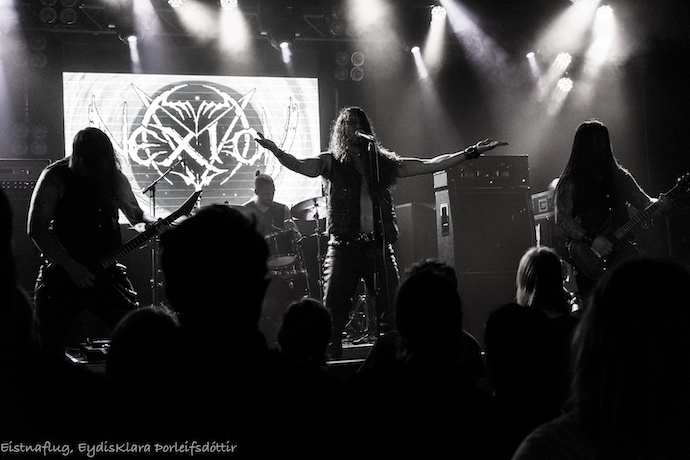
Why don’t you listen to Icelandic BM? I know you are a fan of other BM bands like Marduk… Do you prefer Swedish BM, perhaps?
Haha! Marduk. Back to the vocal discussion. Daniel Rostén is perhaps the greatest black metal vocalist of our time. I don’t believe I would have ever even cared about Marduk, were it not for his voice. But no I don’t prefer “Swedish Black Metal”. I have a hard time justifying breaking black metal bands into national categories. It feels like something scenesters and idiots do, and I think that there is a serious problem where a handful of great musicians in one country do something unique and then a horde of imitators regurgitate their brilliance and fashion some sort of scene title for it. “Swedish Black Metal”. “Norwegian Black Metal”. “Icelandic Black Metal”. There are great bands and shit bands and innovators and imitators in all of these places.
I don’t have a reason why I don’t listen to much black metal out of Iceland. Music is subjective, and not much has grabbed me. There doesn’t need to be a reason beyond that. Currently one of the projects I am looking forward to most is the new album, Melinoë, by Akhlys, from Colorado.
What makes Icelandic BM distinct from other scenes in your opinion?
Well it is a smaller country so everyone knows everyone. That creates an atmosphere of shared influence and crossover that you might not see in a lot of other places. There’s a running joke that everyone is in everyone else’s band and you can tour 3 bands for the price of one. Aside from that, very little makes it distinct in my opinion. Aside from the attention that we seem to get from abroad. But I think that goes hand-in-hand with Iceland being small, and Iceland being fascinating. We are on the map. So our scene gets seen.
But you live in Norway now, so how do you feel here in Norway?
I love it here. I live out in the countryside, away from people and in tune with the pulse of Nature. I already feel connected to the landscape and the trees and the spirit of the earth. The seasonal cycle is a lot like where I come from so it has a sense of familiarity as well as a feeling of the unknown. I can sit on the mounds of dead kings and walk between their stone monuments, or I can go into the wilds and forget about the living and the dead. There are more things to do here and more opportunities when it comes to my interests. If all goes well I will be staying for a long time.
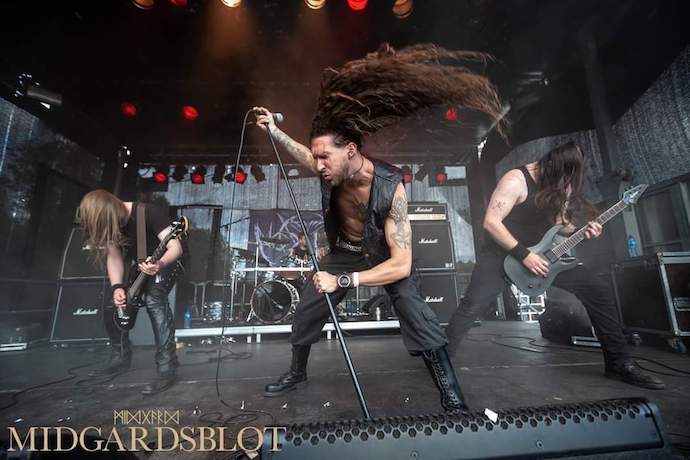
What are your plans when it comes to becoming a part of this scene? Where do you see yourself in some years if you stay around here?
Well I have already become involved with organizing Midgardsblot. I’m one of the organizers of the lectures and workshops. I have one solo project on the way, and a second that I’m still looking into, but neither of them are metal. I might be inclined to dip my toes in and see about getting involved in a metal project here. I don’t really have plans other than to continue to be active and do the things that I enjoy doing.
What do you think about Norway as a metal country so far?
Well the average Norwegian is about as metal as a vanilla wafer. But that’s ok. Metal is and has always been subversive. My friends and acquaintances in the metal community in Norway are some of my favorite people. Ironically, most of my projects and work since moving here have been in the “Nordic” or “Electronic” directions. Corona struck shortly after moving here so I haven’t really experienced much of the metal scene. I’m a bit more reclusive than to go to festivals or gigs anyways, but I’m looking forward to taking a trip to Bergen to see some of my friends that way when I get the chance.

Interesting bit about the use of vocals being an instrument and how Covid’s influenced this band. Very competent band, but no itches scratched, Im sad to say. Perhaps in a live setting, I’d be sucked in more….